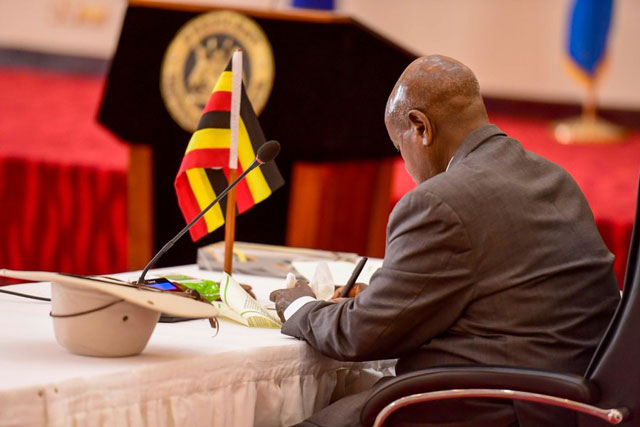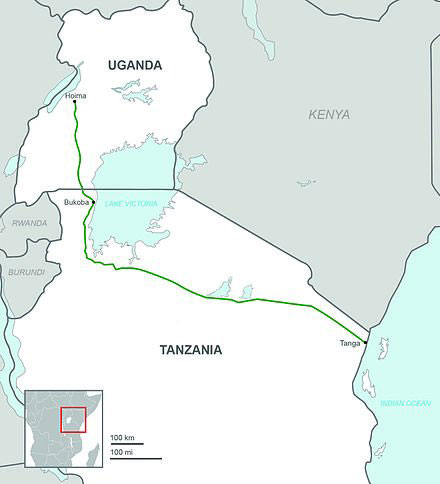
Entebbe, Uganda | THE INDEPENDENT | President of Uganda Yoweri Museveni and the President of Tanzania Samia Suluhu today April 11, 2021 signed agreements to start full implementation of the East African Crude Oil Pipeline (EACOP) project.
Museveni said he asked Suluhu for an April 11 signing, a day that was celebrated in the years after 1979 as Liberation Day. Liberation day was the day Tanzanian troops, backed by Ugandan exiles under the UNLA, overthrew President Idi Amin.
At Entebbe on Sunday, the two countries concluded the Tariff and Transportation Agreement (TTA) and the Host Government Agreement for the Republic of Uganda.
With the Shareholding Agreement (SHA) for Shareholders to the EACOP Company also concluded, the EACOP Project can now be launched, and award of the main Engineering, Procurement and Construction Contracts (EPC) can start.
Tanzania on their part also agreed to finalise the signing of the Host Government Agreement and related agreements between the Government and EACOP Company.
*****
MUSEVENI’S FULL SPEECH
*****
The Chief Executive Officer, Chairman and Delegation from Total SE;
The President and delegation from CNOOC;
Cabinet Ministers;
Ladies and gentlemen.
Your Excellency,
Samia Hassan and your distinguished delegation.
You are most welcome to your brother country of Uganda. Again, condolences on account of the death, recently, of our brother H.E. Magufuli. Also congratulations on your inauguration as President of the United Republic of Tanzania. Thank you for responding to my invitation to join us and the Total Company of France to sign the Agreement on the East African Pipeline from Hoima to Tanga.
Your brother country of Uganda, discovered petroleum and gas in 2006. It has taken these 15 years before the first oil, on account of the divergent perceptions between us and the oil companies.
Initially, I did not favour the idea of the pipeline. My question was: “Why export the oil. Don’t the East Africans need the oil?” In this thinking, I preferred an Oil Refinery only, so that we use the extractable oil out of 6.5 billion barrels confirmed in only 20% of the potential area in the Mwitanzigye and Butuumbi valleys (known as the Albertine Grabben by the foreigners), to satisfy the demand for the refined products for Uganda, North Western Tanzania, Western Kenya, Rwanda, Burundi, Eastern Congo, South Sudan and South Western Ethiopia, with cheaper products on account of the lower transport costs.
The demand in this zone is now 98,250barrels per day. Uganda’s demand is currently 38,785 barrels per day. At the price of US$50 per barrel (equivalent to about US$63 per barrel of products), this locally refined petroleum, would knock off US$1.22billion from Uganda’s import expenditure for petrol, diesel, aviation fuel and tar for roads. If you include the petroleum bye-products, such as plastics, the saving on the import bill would add another US$400millions. Using the extractable portion of the 6.5billion barrels confirmed, this would ensure petroleum self-sufficiency for the Lake Victoria Basin Countries and those neighbouring them for a period of 38 years based on the present consumption levels. This Oil Refinery would be owned jointly by the East African Governments, if they agreed to participate.

The oil companies, however, were biased in favour of exporting crude oil only. The compromise, then, was: “Ok, let us have both the Refinery and the Pipeline.” Most of this, was when the Tanzanian route was not in the picture. We were still debating about Mombasa and Lamu of Kenya. When the Tanzanian route of Tanga became more viable, a new consideration entered my mind ─ the historical role of Tanzania in the liberation of Uganda in both 1978/79 and 1985/86. On these two occasions, Mwalimu Nyerere played a very important role. In the 1978/79, TPDF played the major role in removing Idi Amin from power. In 1985/86, Mwalimu Nyerere gave us 5000 rifles at the right time, just before the assault on Kampala, starting on the 17th of January, 1986.
Kenya, of course, is a brother country, just like Tanzania. However, historically, there is this unique role of Tanzania. I am, therefore, most satisfied, that the project will make a modest contribution to the development of Tanzania. It cannot compensate for the huge sacrifice Tanzania made for the defeat of Idi Amin and the liberation of the whole of Southern Africa (Mozambique, Zimbabwe, Angola, Namibia and South Africa). It is just a modest contribution.
Moreover, this pipeline project, can be a core of bigger developments if the brothers in Congo Kinshasa and South Sudan choose to also use it for their oil. At the maximum, it can carry 230,000 barrels per day. Besides, the same corridor, can take a return gas pipeline, supplying Tanzanian and Mozambiquan gas to Uganda and the Great Lakes’ region.
I salute the Government of Tanzania for the tax concessions they made to keep the tariff paid by the owners of the oil to be limited to US$12.77 per barrel.
Recently, we also made concessions regarding the land and port charges. This will, in effect, push the tariff to US$13.03 per barrel.
The Lamu route was proposing US$15.8 per barrel as tariff. All this, is on account of the extractable portion of the 6.5billion barrels confirmed and licenced for production as already pointed out. This is, however, only in 20% of the MwitanzigyeButuumbi basin (known to foreigners as the Albertine Grabben).
There is a high chance for more oil and gas to be found in the remaining 80% of the oil province, especially in the Mwitanzigye area (such as Kibiro, Butyaba, etc). Then, there is a totally new hydrocarbon zone in the North East of the country, in the Mount Kadam basin. There are oil sippages on the surface, there are source rocks, reservoir rocks and trap rocks (accumulation rocks), that have been seen. If the brother countries work together, there is, then, the oil in Congo and South Sudan. This pipeline could turn out to be a very important project that may serve the region, not only in the short term but also in the medium, if not in the longterm.
This project should, in addition to what we have said, serve to awaken all Africans that prosperity and strategic security, are only possible if we use the Pan-Africanist approach that gives us a bigger market and rationalizes economic linkages.
I cannot end these brief remarks without thanking Her Excellency Samia Hassan for indulging my sentimental request of conducting this signing ceremony on the 11th of April, 2021. Forty two (42) years ago, this same day, is when the Tanzanian troops of 20 Division captured Kampala and enabled a Ugandan Army officer, Oyite Ojok, to announce the fall of Idi Amin on Radio Uganda. At that very moment, with my rapidly growing Fronasa troops, operating with another TPDF division, the Task Force division under Major-General Silas Mayunga, I was on the Mbarara Front. 20 Division was under General Munguri. Today, therefore, is a triple victory for Tanzania and Uganda: military, political and economic.
Long live Tanzania
Long live Uganda
Long live President Hassan.
I thank Your Excellency and your delegation for coming for this function. I also salute the people of Tanzania for agreeing to host the project.
11th April, 2021 – Entebbe
 The Independent Uganda: You get the Truth we Pay the Price
The Independent Uganda: You get the Truth we Pay the Price






